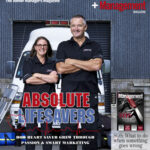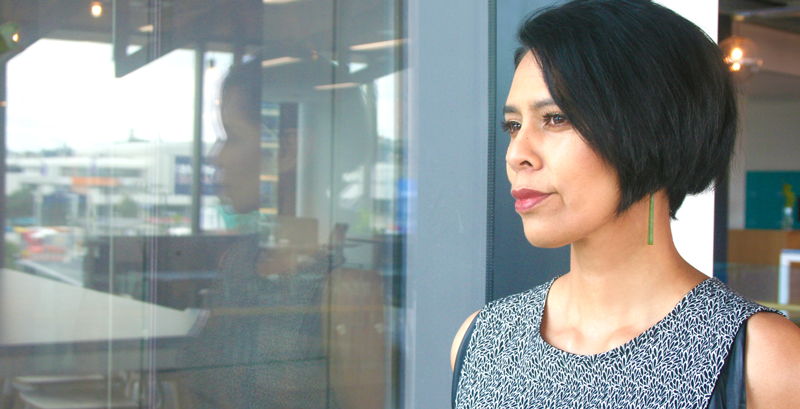It’s a kind of magic
Geo AR Games is a geospatial augmented reality games business creating digital…
Geo AR Games is a geospatial augmented reality games business creating digital playground magic for children starved of outdoor activities. Co-founders Melanie Langlotz and Amie Wolken are the chief magic wand wavers.
Ahhh, remember the good old days when neighbourhood playgrounds up and down the country were alive with the sounds of young children playing?
Playtime stretched out until the sun went down and bodies were exhausted.
Then along came PC games and smartphones, leaving those playgrounds strangely silent.
But now there’s good news. It’s called AR (augmented reality) – more specifically, a company called Geo AR Games and a digital playground app based on AR called Magical Park – a world first, no less.
Melanie Langlotz and Amie Wolken are the co-creators of both company and game. The idea for the app came to Melanie in 2011, when her then seven-year-old stepdaughter refused to play outside because she found mobile and PC games far more stimulating.
A scenario being played out in homes everywhere.
“Because of my background in the digital entertainment industry
I had seen a shift in the consumption of entertainment and had the idea to move the games my stepdaughter loved so much outside and make them mobile outdoor games,” she explains.
“I had researched AR and in 2012 joined another start-up called Augview specifically to learn the technology required to make an outdoor AR game. I met Amie there and in Sept 2015 we launched Geo AR Games.”
The first task was to raise some investment money. The pair were advised to join a female business incubator called S-Factory in Chile.
Why Chile, you may ask?
“They were looking for their second cohort of international start-ups,” explains Melanie. “We needed money to get started on building our prototype and this incubator gave us cash to survive for three months and focus 100-percent on building the product, plus teach us how to build a successful start-up.
“We needed to learn how to fast-track and get investment ready, so there were two incentives [to go to Chile] right away. The incredible thing was that they offered us $20,000 for no equity!”
Melanie says the Chilean government encourages offshore start-ups because they influence local business people with their ideas, attitude and outside knowledge.
“Chile is seen as the most innovative South American country.
It was definitely worthwhile.”
In Chile Melanie and Amie met a Lightning Lab alumni; applied for Lightning Lab in New Zealand, and eventually joined the Wellington cohort, which added more good connections to their network.
They managed to build their first AR game, Sharks in the Park, in Chile, and after some television exposure here it was rated the number one New Zealand kids app virtually overnight.
Then came a pivotal moment.
Their mentors at Lightning Lab asked a few tough questions – like, how will they make money? How will people find them on the app store amongst the clutter?
Time to go back to the drawing board.
The result was Magical Park, released in April 2016, quite different to Pokemon Go, and geofenced so it can only operate in activated parks, vetted by local Councils.
“Magical Park (www.magicalpark.net) is part of a new ethical kids gaming trend that doesn’t allow in-app purchases or unhealthy advertising in the game,” says Melanie.
“In September 2016 Wellington [Council] placed their first order for two parks, followed by Auckland where we now have nine active parks, as well as Hastings, Dunedin, Selwyn and two in the Tasman area.
“We partnered with the NZ Recreation Association and Parks & Leisure Australia and in March this year we did a big push with a Parks Week campaign.
“Within three weeks we went from 14 active parks to 176! Admittedly they were only two-week pop-ups, but it got over 24,000 people out into parks and kids played over 1,200 hours of Magical Park.
“In September we launched a new version which features retention mechanics to motivate kids to want to go back to the park exercising. Exercise is rewarded in the game and on average kids run between 700 metres to two kilometres per game.”
Melanie says they now have Councils on board in almost all major Australian cities, their first Magical Park in the UK and are about to set up in Canada.
Councils pay a sub for each park (between $500 for a one-week pop-up to $2,500 for an annual license). Feedback from parents, kids, teachers and Councils has been very positive.
“Kids say it makes a boring park more interesting and parents say it’s great to get the kids out and about. It’s a very social game,” says Melanie. “Councils love the fact that we can use underutilised space, don’t need to set anything up, and therefore it’s low maintenance but forever evolving.
“We are constantly working on new features and our biggest challenge is how to market an invisible playground and let people know about it.”
Challenges and advice
Geo AR Games has quickly made inroads into the geospatial AR games space, aided greatly by the skills of Amie, who had started at Augview as a junior developer and rapidly progressed to board executive. It only took her three months to build the first prototype of Sharks in the Park, her first ever game.
Revenues from Magical Park have grown significantly since March, but the challenge now is to successfully market the game further and grow the business exponentially.
“We’re still only a two-person team, but we have amazing partners, such as New Zealand Recreation Association, Parks & Leisure Australia and ukactive, who help us with marketing and sales for a commission,” explains Melanie.
“Knowing what investors are looking for and at what stage it’s worth spending the money to go overseas for investment is key,” she says.
Melanie recommends connecting with possible investors very early on even if it is going to be a while before you are looking for investment. “The later you get investment and the more mature your company, the better, since you don’t have to give away too much equity.”
Be picky with investors since they have to match your values and invest for the right reasons, she advises.
“Also, choose an investor based on what can they do for you, instead of just giving you money. You want them to have connections, open doors, and help grow the company from an objective point of view.
“You do not want an investor who ends up micro-managing your company and your staff.”



